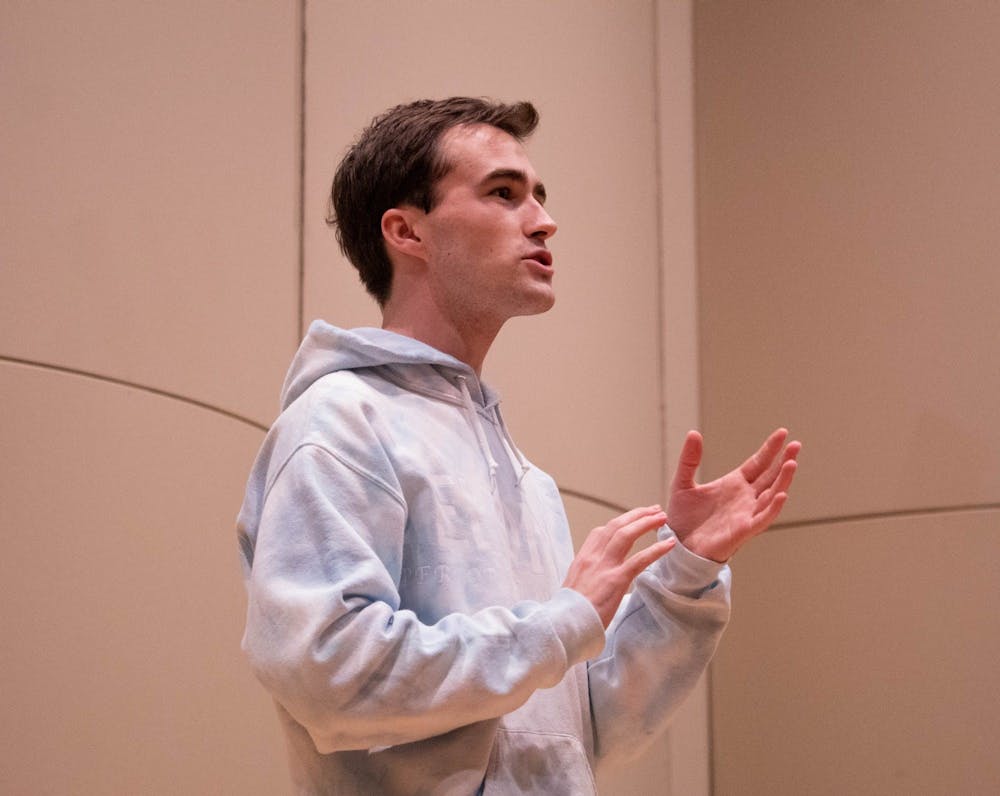Junior Jack Morrill told workshop attendees that this was to be viewed as a safe space — cameras were optional and everything was done anonymously, beginning with a grounding activity. Participants were invited to center themselves by thinking about natural spaces, clearing their minds and breathing deeply before partaking in a 90-minute Zoom call about queer identity within theater.
This was the first of three “Queering the Stage” workshops brought to Elon University by Morrill’s Lumen project. His ultimate goal is to bring queer artists and theater professionals to Elon through a series of interactive Zooms to engage with students and faculty. On Feb. 4, the first workshop, entitled “Breaking the Binary” was presented by theater professionals SK Kerastas and Lisa/August Evans. Both Evans and Kerastas identify as nonbinary, and Evans uses both Lisa and August to represent both parts of their identity.
But in order to break the binary, Kerastas and Evans first had to define it. To facilitate their talk, Evans and Kerastas provided working definitions of such terms as queer, gender, sexual orientation and transgender identity. Kerastas and Evans used the website Padlet to allow for anonymous answers to focus questions throughout the workshop as well as Google Jamboard to create the idea of a “faulty binary,” according to Kerastas.
“To create the space for everyone to be their full selves and supported and honored in intersectional ways, it actually disturbs the system,” Kerastas said. “Which is maybe not a bad thing. It doesn’t have to happen all at once, but that’s actually part of the point. Because the systems that we operate under now are built to service few, and not everyone.”
The workshop spoke broadly at first about queer identity and experiences before honing in on what it means to be a queer performer in a “traditionally heteronormative” dominant culture, according to Evans.
“The goal, always, the primary reason to know all of these things is to be able to interrupt dominant culture and really intentionally build new practices,” Evans said.
These two key themes were exactly what Morrill hoped to achieve with his project.
“Basically, it is using queer practices and looking in different mediums such as rehearsal rooms, in books, in plays, and seeing what are practices that queer artists and queer community members use when either just being in the community with other queer people or when creating their own work,” Morrill said.
According to Morrill, those practices include, “intersectionality, inclusion in the broadest sense, equity, accessibility, transparency and the idea of futurity” within theater spaces. Each workshop strives to present different ways of implementing these practices and ideas based on the lived experiences of the speakers.
As his Lumen project, Morrill found it essential to bring back these ideas and research to the rest of the Elon community by making the workshops accessible by Zoom.
“It’s important for students because it’s important for them to know that there are queer artists out there,” Morrill said. “There are people who are doing work that they might be interested in doing. That they don’t have to start from scratch and that these are now resources for them to use.”
This point resonated with senior Mercedes Ruiz. A drama theatre studies and arts administration double major herself, she was thrilled to see other queer artists doing the work she wanted to do.
“I went to this event because I’m a queer artist,” Ruiz said. “I was interested to meet other queer artists who were in the professional world and see what they’re up to these days, and how I can get from where I am to where they are now.”
Ruiz encouraged those who don’t identify as queer or aren’t involved with theater to attend the workshops as well.
“It really revealed a lot about the norms that we have in society and that can be applied to any area of expertise, whether it be in the business world, whether it be in the medical field, whether it be in the arts world,” Ruiz said. “The themes that were present in the presentation can be applied across all of those fields.”
Overall, Morrill aims to see these workshop practices implemented within theater spaces at Elon to give students a chance to find a community before they leave college.
“It’s not that change isn’t happening,” Morrill said. “It’s now that, okay, let’s look at the student body we have now. What do they need? How can we change it for them? And so I think that’s what this workshop series might help inspire.”
For more details about “Queering the Stage,” visit Instagram account “queering.the.stage” for an RSVP link for the next workshop and details about the speakers. The workshop will be hosted on Feb. 25 from 2 to 3 p.m.


